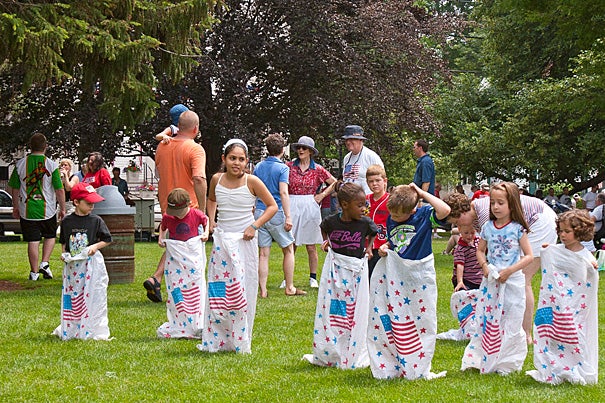
Harvard Kennedy School Assistant Professor David Yanagizawa-Drott and Bocconi University Assistant Professor Andreas Madestam investigated the impact of youth participation in Independence Day activities and adult engagement in the political process.
Justin Ide/Harvard Staff Photographer
Fireworks in the voting booth
How childhood Fourth of July fetes affect adult political behavior
Not every child in America has the opportunity to attend Fourth of July celebrations, but those that do are prone to be more politically engaged and associate more closely with the Republican Party than their peers. Those are two conclusions in a new research paper co-authored by Harvard Kennedy School Assistant Professor David Yanagizawa-Drott and Bocconi University Assistant Professor Andreas Madestam.
The paper, titled “Shaping the Nation: Estimating the Impact of Fourth of July Using a Natural Experiment,” examines how important childhood experiences shape political views and behavior patterns later in life. Researchers investigated the impact of youth participation in Independence Day activities and adult engagement in the political process.
“In 2010, an estimated 144 million Americans age 18 or older celebrated Fourth of July by attending a barbecue. Another 98 million watched the fireworks or went to a community festivity, while more than 28 million saw a parade,” the authors write. “Beyond the immediate fervor of the festivity, however, do national day celebrations matter? Does participation in national ceremonies and parades have a deeper impact by affecting children’s political beliefs, identity, and behavior?”
Researchers faced two main challenges when they examined how important formative experiences in childhood affect later-life outcomes. First, it was difficult to disentangle the causal impact of any particular experience — may it be the family, the education system, peers, or an event such as Fourth of July. Second, there was a lack of data linking childhood experiences to adult outcomes.
In their paper, the researchers used a simple but novel strategy to address these problems: historical data on rainfall on the Fourth of July. When it rains, children and their parents are less likely to participate and the events are often canceled, while the opposite is true with nice weather. This allowed the researchers to isolate the effect of attending the celebrations from other important factors, such as family background and education.
Key conclusions in the paper include:
- Fourth of July celebrations have a significant impact upon people’s political preferences;
- Attending one Fourth of July event before age 18 increases the likelihood of identifying as a Republican by at least 2 percent and voting for the Republican candidate by 4 percent. It also increases voter turnout by 0.9 percent and boosts political campaign contributions by 3 percent.
“We were surprised to find that childhood experiences of Fourth of July celebrations could have such persistent effects,” said Yanagizawa-Drott. “The evidence suggests that important childhood events can have a permanent impact on political beliefs and behavior and that Fourth of July celebrations in the U.S. affect the nation’s political landscape,” he concluded.




